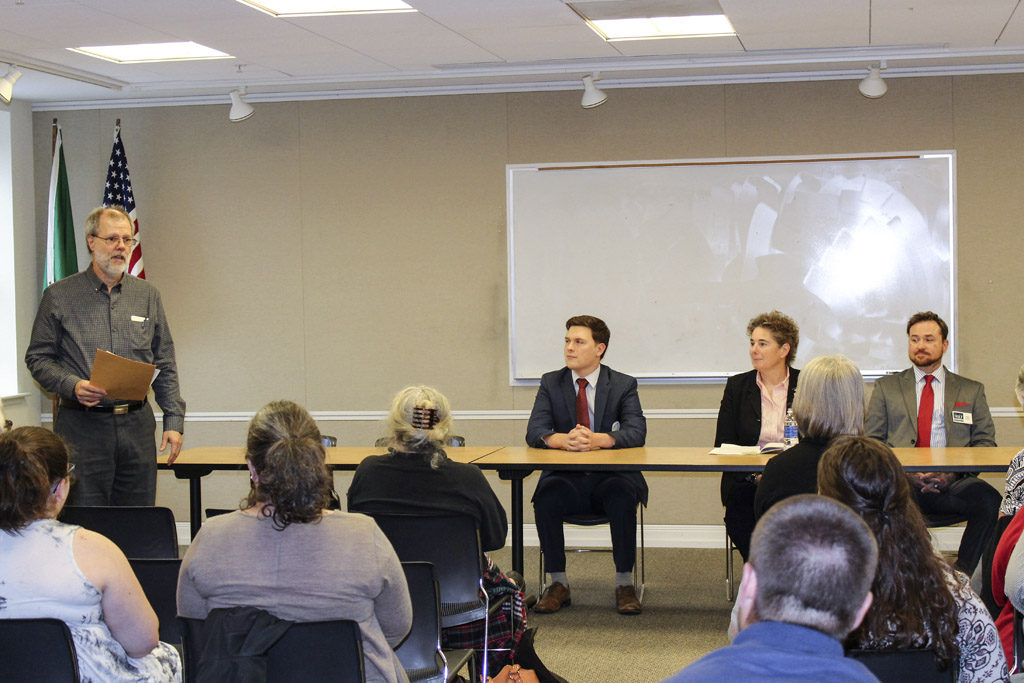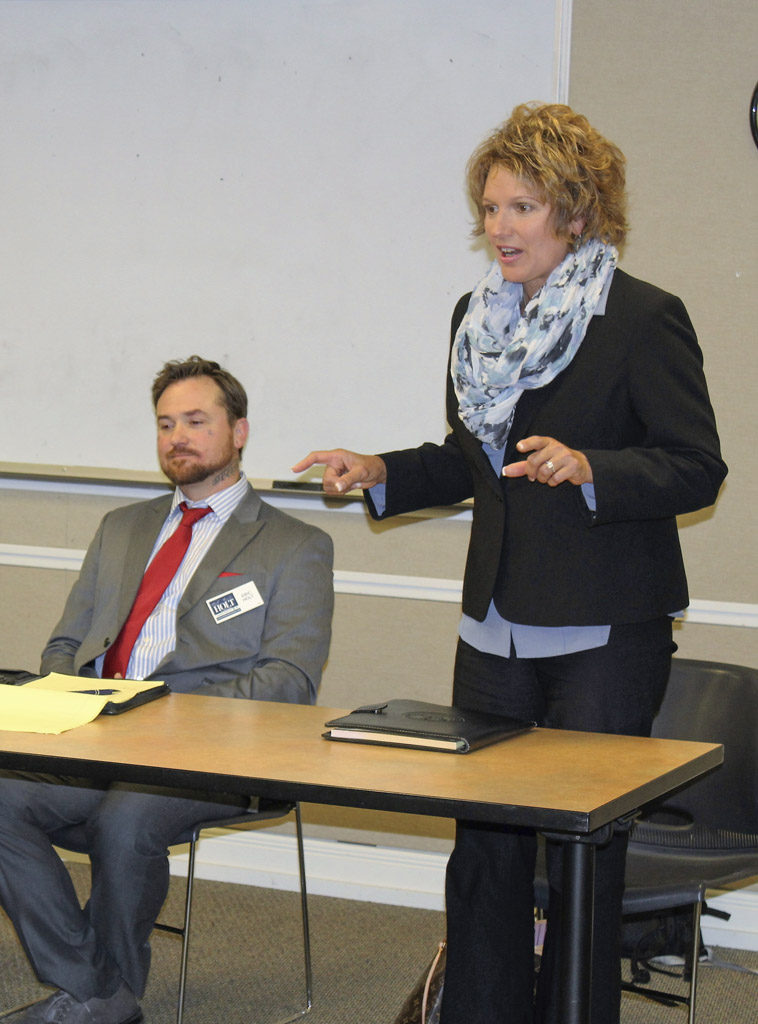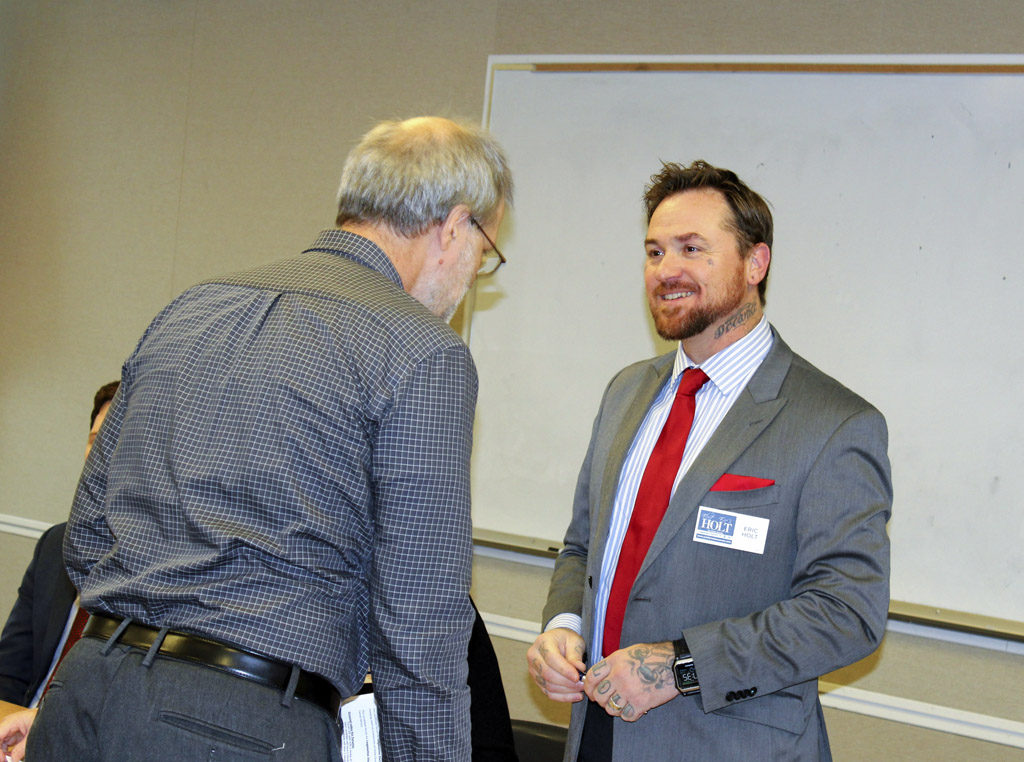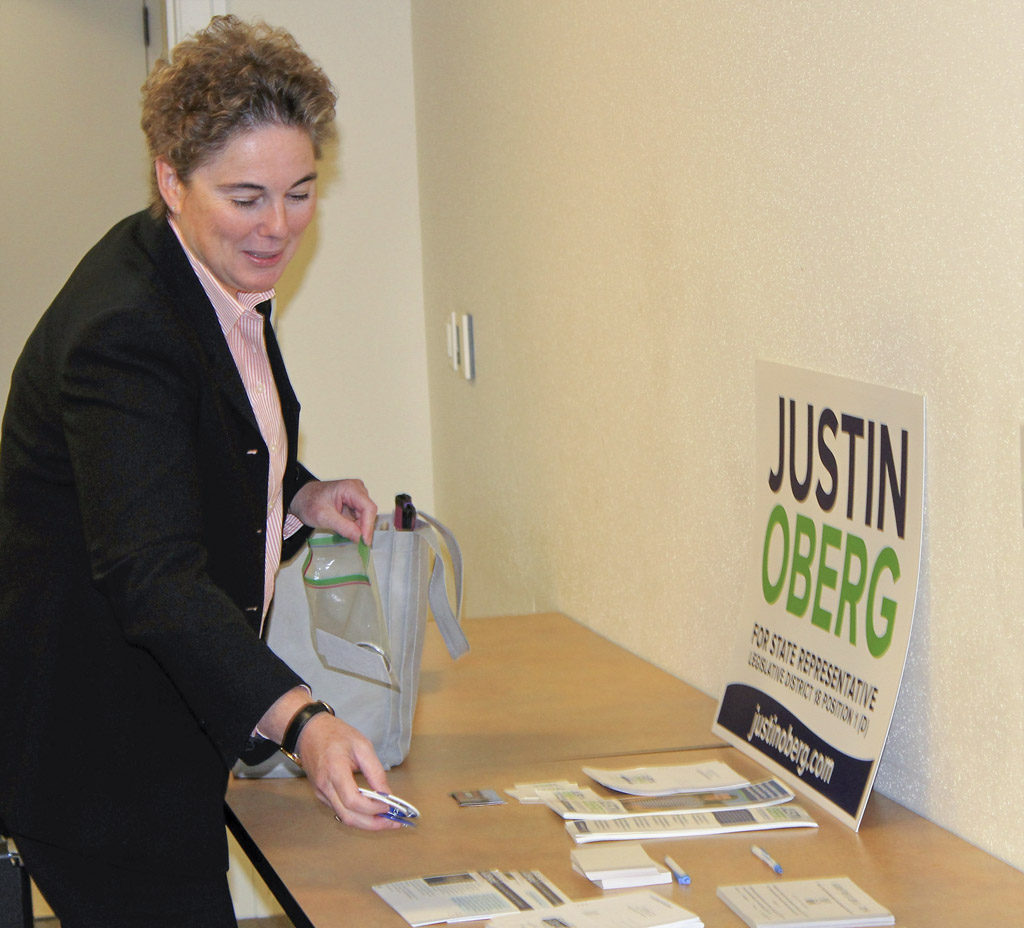CAMAS — Education funding, traffic congestion, corporate tax exemptions and Clark County’s infrastructure needs were hot topics at last night’s Candidate Forum for Legislative District 18, held at the Camas Public Library.
Sponsored by the bipartisan Neighborhood Associations Council of Clark County (NACCC), the Oct. 12, event was described as a way for community members to better understand each of the six candidates running for House and Senate positions in Legislative District 18, a district that covers rural and urban areas throughout much of Clark County, including Vancouver, Camas, Washougal, Ridgefield, Battle Ground, La Center and Yacolt. The district also represents citizens living in several parts of unincorporated Clark County including Brush Prairie, Hazel Dell and Salmon Creek.
Only one incumbent – Republican Rep. Liz Pike – showed up to the forum. The other two Republican incumbents, Sen. Ann Rivers and Rep. Brandon Vick, were absent. All three of the Democratic challengers – Eric Holt who is challenging Rivers for her Washington Senate seat; Justin Oberg, who is running against Vick for the district’s Position 1 in the State House of Representatives; and Kathy Gillespie, who is challenging Pike for Position 2 – attended last night’s candidate forum.

On its Facebook page, the NACCC group says all candidates were invited to attend the forum in June, so there was “no excuse for an empty seat.”

NACCC chairman and forum moderator, Paul Ballou, said his group selected the forum format as a way of educating voters about their local senator and representative candidates.
“It’s not a debate. I’ll be adding no commentary,” Ballou said, adding that the candidates would all be asked four questions that neighborhood leaders had decided on more than a month ago. Afterward, there would be time for audience questions and closing remarks from each of the candidates.
The first three questions quizzed the candidates on their budget priorities, solutions to traffic congestion in Clark County and their views on the proposed oil terminal in the Port of Vancouver. The fourth question was based on the recent controversy about escaped mental health patients and leadership changes at the Western State Hospital in Lakewood, Wash., an issue that Republican gubernatorial candidate Bill Bryant has brought up as a point of contention in his campaign against Gov. Jay Inslee. Later, an audience member asked the candidates to speak about education and about their plans to fully fund K-12 education in Washington.
Following are a few of the key takeaways from last night’s candidate forum:
On traffic congestion and transportation needs in Clark County
Each candidate for Legislative District 18 was asked how they would decrease traffic congestion between Washington and Oregon in Clark County and how they would fund their proposals.
Candidate Kathie Gillespie, the current director of the Vancouver Public Schools School Board who is running against Rep. Liz Pike for Washington State Rep., Position 2, went first.
“Two years ago, we had a potential solution and we couldn’t make it work,” Gillespie said, referring to the failed Columbia River Crossing project that would have replaced the Interstate 5 bridge between Vancouver and Portland, using a mix of federal and state dollars from both Washington and Oregon. “The federal money is gone now, but this corridor is so important to Washington, Oregon and California, that we need to fight and flex our muscles to demand that money.”
Gillespie said that, when she thinks about the people who are stuck in traffic congestion, trying to cross the Interstate 5 bridge to work in Oregon or return to their Clark County homes, she thinks about the parents who are in their cars instead of at home with their families, or at their child’s school plays or sporting events.
“This goes beyond just the wait times and the frustration of drivers,” she said, adding that the traffic congestion in the Vancouver area also affects the county’s economic interests.
“I talked to Ridgefield’s mayor and he said he’s been in negotiations with a business from Oregon who said no (they wouldn’t move their business to Ridgefield) because of the bridge. We are losing business here … and we have to find the answers.”
Eric Holt, a self-described progressive who is running against Sen. Ann Rivers — one of the Columbia River Crossing’s most vocal opponents — for the Legislative District 18’s senate seat, said he sits on the Interstate 5 bridge twice a day, so he understands the frustrations with traffic congestion in the Clark County area.

Citing the $200 million that the state has already spent on engineers and environmental impact studies for a new Interstate 5 bridge, Holt said he believes it is good governance to “not waste that money,” but to find another solution for the failed Columbia River Crossing.
With a transportation industry background – he has managed more than 60 truck drivers throughout the Pacific Northwest, oversaw Department of Transportation compliance and training issues and was himself a Teamster truck driver and shop steward for Teamsters Local 162, a Portland area union that represents workers in the freight, package delivery, food and beverage distribution and trucking industries – Holt says he understands how to move freight efficiently and safely.
“And I know you don’t do it with a drawbridge and heavy traffic,” Holt said.
One of Holt’s ideas for reducing traffic congestion is having a freight corridor that would bypass the most populated areas and get truck traffic away from the increasingly congested Vancouver metro area. He also thinks that the idea of building a new bridge in eastern Clark County, near Camas and Washougal, to connect to Portland’s Interstate 84 is a bad idea: “I just don’t see how it would improve traffic. It’s just diverting it from one end of the county to the other.”
Rep. Liz Pike said she is proud of her efforts to gather bipartisan support for a house bill that would create a bi-state (Washington and Oregon) legislative action work group to look at new bridge solutions to improve traffic congestion in the Vancouver/Portland metro areas.
“I think this speaks to my ability to reach across the aisle,” Pike said at Wednesday night’s candidate forum.
Citing the city of Portland’s push for more commuters to use public transit or bicycle to work, Pike said she sees a big difference between the communities in Clark County and those across the Columbia River in Oregon.
“Portland people like transit. Clark County people live here because we like our cars,” Pike said.
Pike said she believes the area needs to have three bridges and that the current I-5 bridge must either be replaced or retrofitted.
Justin Oberg, who is running against incumbent Rep. Brandon Vick for Legislative District 18’s Washington State House Representative Position 1, said he was disappointed that his state representatives and senators weren’t able to come together and take advantage of the $1.5 billion in federal funding for the failed Columbia River Crossing and that he would like to see Washington state legislators rebuild relationships across the river in Oregon as well as in their own state to solve Clark County’s traffic woes.
“I think these relationships were broken beyond repair and we need fresh faces to help rebuild them,” Oberg said. “We should have replaced that (I-5) bridge years ago.”
Oberg said he is also concerned that the lack of movement on the part of state politicians to provide a reasonable fix for the Interstate 5 traffic congestion at the Washington/Oregon border is costing Clark County valuable jobs.
“We do lose businesses, businesses that provide living wage jobs, because they look at Vancouver and they see a traffic congestion problem,” Oberg said.
On Education and funding Washington’s K-12 schools
Another big topic at the Oct. 12 candidate forum had to do with educating Clark County’s youth and funding the state’s K-12 schools.
All three of the Democratic candidates running for Legislative District 18 positions said finding ways to fully fund K-12 education was a top priority.
“We have to come up with a plan. We have to get this done,” said Holt on meeting the Washington Supreme Court’s order that Washington State legislators find a way to fully fund K-12 education.
Holt said the state would be able to fully fund its K-12 education system if it stopped providing giant tax breaks to corporations who don’t follow through on their promises of providing living wage jobs to Washington residents: “When we give tax breaks to companies who come here, promising jobs, and then don’t, we need to stand strong.”
Sunsetting such corporate tax breaks could provide money needed for things like education and infrastructure throughout Washington state and in Legislative District 18, Holt said.
Rep. Pike said she is proud of the $5.5 billion state legislators added to the education funding in 2016 and called it “the biggest increase in (state) history” for K-12 funding. She said she would like to see state legislators fully fund education and “then fund everything else.”
Gillespie, Pike’s challenger for the Position 2 seat, has served on the Vancouver Public Schools School Board since 2009 and has two college-aged children who graduated from Vancouver’s School of Arts and Academics. She spoke at length at the Oct. 12 forum about the need to fully fund K-12 education in Washington State, saying education would be one of her top priorities if elected to the legislature in November.

“We have been underfunding education in Washington for 40 years,” Gillespie said. “The state is underfunding basic education by eight to $10 billion. Recently, the legislators put some money in, but they’re still leaving them (schools) short … I find it reprehensible that we are still underfunding education in this state.”
When it comes to funding education, Gillespie said she would look to stemming corporate “tax giveaways” before she would ever ask taxpayers for more money.
“In 2013, we gave $8.3 billion to Boeing, the largest tax giveaway in the U.S.,” Gillespie said. “We cannot afford it when we cannot afford to pay our bills.”
Rep. Pike said she had voted for the Boeing tax break and that it was “one of the most difficult votes” she’d ever had to make. However, she clarified, the vote was to extend a tax break that was set to expire in 2025. The extension, until 2040, gives the company an additional $8.3 billion over that 15-year period.
“Boeing is 12 percent of our economy and I wasn’t willing to be the representative who shut the lights out on our aerospace industry,” Pike said.
Oberg said he supports fully funding public education in Washington state and, in fact, that issue was “one of the reasons (he) jumped into this race.”
Like Gillespie and Holt, Oberg wants to see big corporations pay more in taxes to help fund the state’s education, infrastructure and other “basic needs.”
On Wednesday night, the 23-year-old lifelong resident of Legislative District 18 and graduate of Columbia River High School, Clark College and Washington State University in Vancouver, said he believes his opponent, Rep. Vick, has the wrong idea when it comes to funding education in Washington. Under Vick’s “levy swap” proposal, Oberg said, money from local levies would help pay for basic things, like paying schools’ heating bills, that should be funded by state dollars, not local levy funds.
“I listened to the ideas being put forth by my opponent, specifically the levy swap, and I thought, ‘we’re missing a huge hole: the corporate tax breaks.’”
After Rep. Pike brought up the need for more schools to concentrate on training students for non-college-path jobs, which she said comprise 75 percent of the living wage jobs available in Washington state today, Oberg said he sees the need for more things like technical and vocational training in Washington’s high schools, but added that he would like to the see the state legislature fund schools’ basic needs like heating and teacher salaries first.
“We can’t fund those types of things until we fund our basic needs,” Oberg said.
Along with education and transportation, the candidates spoke at length about the need for more affordable housing in Clark County, whether the proposed oil terminal in Vancouver’s port would pose an environmental or health hazard and the need for better leadership at the Western State mental health hospital as well as the need for more resources toward mental health prevention and treatment in Washington State.
To learn more about all of the candidates’ views on the big issues, visit their websites, listed
below:
To find out who is funding these candidates’ campaigns, visit the Washington State Public Disclosure Commission site and enter the candidate’s name.




